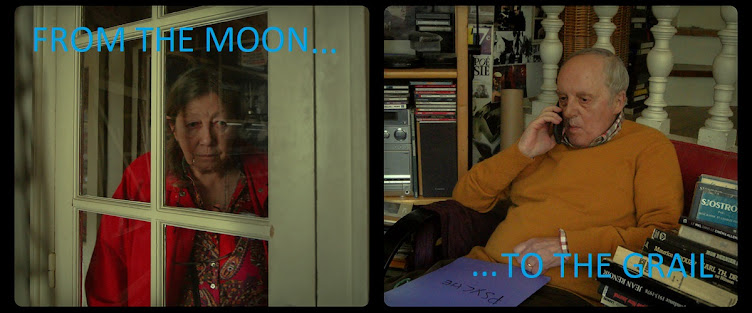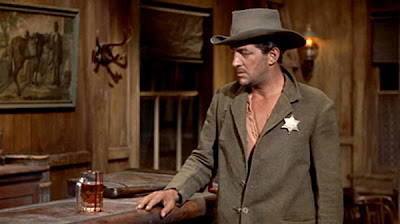Running Time: 75 minutes
Directed By: William A. Wellman
Written By: Lamar Trotti, from novel by Walter Van Tilburg Clark
Main Cast: Henry Fonda, Dana Andrews, Anthony Quinn, William Eythe, Harry Morgan
Click here to view the trailer
HENRY FONDA - THE POSTER BOY FOR JUSTICE
I've invented a new phrase that I'm going to try and work into the blog as often as I can. The phrase is "slump buster" and is needed when a film comes along and really pulls me out of a string of disappointing movies. Yeah, I realize "Rio Bravo" was a good one, but beyond that I've been in a real funk lately. That ended today with the viewing of "The Ox-Bow Incident", the first official slump buster!
The film runs only seventy-five minutes long and stars Henry Fonda as Carter, a man who rides into a Nevada town after being away for an unspecified amount of time. Carter, along with his pal Croft (Morgan), hitch their horses outside a local saloon and within five minutes find themselves in a fist fight with another local. Carter's the type who gets calmed by a good fist fight, whether he wins or loses. Meanwhile, there's talk in town of a group of rustlers who have been going around and stealing farmer's cattle. Soon, more horrendous news comes, when word breaks that Larry Kinkaid has been shot and killed. In town, at the saloon, a lynch mob quickly forms, while the Sheriff is away on business and the deputy Sheriff doesn't waste time deputizing the lot of them and leading them through the cold, dark night to find the man or men who shot down Kinkaid. Led by Major Gerald Tetley (Eythe), the mob find the men they're looking for in the Ox-Bow canyon. There are three of them, Donald Martin (Andrews), a young, able-bodied, husband with two children, Juan Martinez (Quinn), a Mexican and a simple-minded, old man. They have in their possession fifty head of Kinkaid's cattle, which they claim to have purchased from Kinkaid. The don't have a bill of sale for the cattle, citing that Kinkaid promised to mail it to them later. They also have a revolver that members of the mob recognize as belonging to Larry Kinkaid, Martinez stating that he found it along the road. The three strangers' story isn't holding much water with the lynch mob (composed of approximately twenty-five people) and as night turns to day, the crowd (save for seven of them) are becoming more and more blood thirsty.
SPOILER ALERT!
Who here doesn't love Henry Fonda? A show of hands, please. Okay, those of you who have just raised your hands, please leave my classroom immediately. I'm kidding, of course, but how can you not love the guy? I'd be hard pressed to think of an actor who I enjoy watching more than Henry Fonda. I'd even be bold enough to call him my all-time favorite actor (and even more bold enough to say that "12 Angry Men" MAY BE my favorite of the near 500 films I've watched from THE BOOK, thus far). I could watch the guy run dialogue with a push broom for ninety minutes and still call it an '8/10' effort. I'll start by saying that I'd seen "The Ox-Bow Incident" prior to today. I saw it for the first time approximately a month before I started the journey through the "1001 Movies You Must See Before You Die" book and loved it then, as I did today. I saw someone mention on another site, that it reminded them of a Western version of "12 Angry Men", just with a different outcome and that's exactly what I was thinking as I watched it today. I saw another man mention that "The Ox-Bow Incident" should be required viewing for everyone and I wholeheartedly agree. The biggest revelation that I took from "Ox-Bow" is the absolute senselessness of the killings and how you can probably flip open the daily newspaper everyday and read about killings that are just as senseless. It was as if the characters in this film were so bored (because the only things to do in their town were drink, eat, fight, play poker or sleep) that they found an excuse to go out and lynch three innocents. They had bloodshed on their mind from the beginning and no matter what the three innocents said, they were going to end the night with a rope necktie. The characters (the ones who are FOR the lynching, anyway) are enough to make you sick and you could collectively call them one of the baddest villains in the history of cinema.
That's why the end is so satisfying. When the Sheriff finally rides into town and brings news that Kinkaid isn't dead at all and says "God have mercy on you, because I sure won't". The tables have turned. Now the accusers have become the accused and without a shadow of a doubt, they're guilty. The parts are played perfectly by everyone involved. I already mentioned that the bad guys - Major Tetley, Farnley, Jenny Grier and Mapes - all are enough to make you sick, so that says right there that they did their job. I also loved Leigh Wipper (who, for some reason, wasn't mentioned in the credits) and Harry Davenport. Big credit goes to the three victims too, who almost made you want to bawl your eyes out. I think I may have sympathized the most with Francis Ford's character (brother of John Ford), the simple-minded, elderly man who literally begged for his life, pleading with his accusers. I would actually go so far as to call the cast perfect. The film does a good job of making it obvious that these three are innocent, especially when you have Henry Fonda standing up for them. That way, we can sympathize with the innocent accused throughout, without ever second guessing where our sympathies lie. I couldn't remember how the film ended, from the first time I saw it, but I kept saying, over and over in my head, "please let it end with the reading of THE LETTER" and it did, a perfect ending to a perfect film. Here it is, in case you forgot how it read, a real fantastic way to end a picture, with a good speech:
 |
| Carter reads the letter aloud to a packed saloon. |
RATING: 10/10 Might as well call it a shoo-in for the TOP 20 list and if it makes it, that will make the fourth straight TOP 20 list that has featured a Henry Fonda picture, as a Fonda movie has nabbed the top spot of the last two TOP 20 lists.
MOVIES WATCHED: 490
MOVIES LEFT TO WATCH: 511
June 28, 2012 12:07am





















.jpg)











_poster.jpg)










